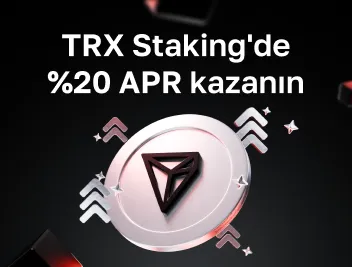
Kriptoda KYC (Müşterini Tanı) nedir?
İçindekiler
Hepimiz, belgelerimizin resimlerini ve bir selfieyi bankamıza, e-ticaret platformlarına ve hatta sosyal medyaya göndererek kimliğimizi çevrimiçi olarak doğrulama sürecinden geçtik.
Bu işleme KYC denir. KYC'nin anlamı nedir ve KYC ne anlama gelir. Bankalar, sosyal medya ve e-ticaret siteleri gibi çevrimiçi platformların, dolandırıcılıklara karşı yüksek güvenlikli koruma sağlamak amacıyla tüm müşterilerinin kimliklerini almak için kullandıkları bir özelliktir.
Bir soyguncunun, dolandırıcının veya bilgisayar korsanının kimliğini gizlemek için her şeyi yapacağı mantıksal gerçeğine dayanmaktadır.
Bu güvenlik önlemi, bankaların müşterilerden gerçek adlarını kullanarak hesap açmalarını talep etmeye başladığı 1900'lü yıllardan beri yürürlüktedir; 2000'li yılların başında internet bankacılığında kullanıldı.
İnternetin yükselişiyle birlikte sizi dolandırıcılardan korumak için sosyal medya ve e-ticaret platformlarında bu güvenlik kontrolü uygulanmaya başlandı.
Bu makaleyi, KYC'nin ne olduğu, KYC'nin ne anlama geldiği ve Cryptomus KYC'nin nasıl çalıştığı ve varlıklarınızı nasıl koruduğu hakkında çevrimiçi birçok araştırma yaptıktan sonra yazdım.
KYC'nin Temellerini Anlamak
KYC'nin ne anlama geldiğini anladığınızı varsayalım. Bu durumda bunun işletmelerin müşterilerinin kimliğini doğrulamak için kullandıkları bir süreç olduğunu tahmin edeceksiniz; karşılaşabileceğiniz dolandırıcılık, kara para aklama ve çeşitli dolandırıcılık veya siber tehditleri önlemek için yapılır.
KYC'nin ne olduğunu daha iyi anlamak için öncelikle KYC uyumluluğunun ne olduğunu ve KYC sürecinin ne olduğunu anlamanız gerekir. KYC uyumluluğu, müşteriler hakkında aşağıdaki bilgilerin toplanması sürecidir:
- İsim
- Adres
- Doğum tarihi
- Milliyet
- Meslek
- Gelir kaynağı
- Finansal varlıklar
Bunun için tüm bilgilerinizin verilmesinden ve pasaport, ehliyet veya elektrik faturası gibi kimlik belgelerinin sağlanmasından oluşan KYC sürecini takip etmeniz gerekmektedir. Bu belgelerin orijinalliği ve müşterinin iddia edilen kimliğiyle eşleştiğinden emin olmak için doğrulanır. Onaylandıktan sonra müşterinin hesabı etkinleştirilir ve işletmenin hizmetlerine erişebilir.
KYC Kriptoda Neyi Anlamlandırıyor?
Artık ne olduğunu ve nasıl çalıştığını bildiğinize göre kripto para alanındaki diğer önemli soruyu daha net bir şekilde cevaplayacağım; bu bölümde KYC kripto para nedir, kriptoda KYC ne anlama gelir, KYC doğrulama kriptosu nedir ve blockchainde KYC nedir göreceğiz.
Peki KYC kriptosu nedir? Dolandırıcılık ve kara para aklamayı önlemek amacıyla kripto borsaları ve ilgili hizmetlerdeki kullanıcıların kimliklerinin doğrulanması işlemidir. Bu, daha sonra resmi belgelerle doğrulanan kişisel bilgilerin sağlanmasını içerir. KYC kripto, işletmelerin operasyonlarının bütünlüğünü korumasına ve düzenlemelere uymasına yardımcı olur.
Artık kriptoda KYC'nin ne anlama geldiğini gördüğünüze göre, sürecin nasıl işlediğine ve nasıl geçileceğine bakalım.
KYC Nasıl Geçilir?
Bir KYC kriptosunun ne olduğunu anlamak ve onu nasıl aktaracağınızı bilmek farklı şeylerdir. Neden? Her platformun kendine ait yöntemleri, görsel boyutu, bilgileri, belge türleri vb. olduğu için ilk adım, kriptoda KYC doğrulamasının ne olduğunu anlamaktı. Şimdi bunu nasıl geçeceğimizi görelim:
Cryptomus, KYC gerektiren kripto platformunun bir örneğidir. Cryptomus'ta KYC testini geçmek için kişisel bilgilerinizi, adınızı, adresinizi, telefonunuzu, numaranızı ve e-posta adresinizi vermeniz gerekecektir; Bundan sonra belgenizi incelenmek üzere yüklemeniz ve bir selfie çekmeniz gerekecektir. Gönderimden sonra, aşağıdaki kılavuzda açıkladığım gibi doğrulama işleminin tamamlanmasını beklemeniz gerekecektir:
Cryptomus'ta nasıl çalışır:
- Kontrol paneline gidin
- Ayarlara gidin
- Sol tarafta KYC kişisel Cüzdan araması yapın
- Doğrulama'ya tıklayın
- Belgenizi gönderin ve yüz doğrulamasını yapın
- Onay için bekleyin
- Onay yapıldıktan sonra Cryptomus'un tüm özelliklerini tam olarak kullanabileceksiniz.

KYC Doğrulamasının Farklı Seviyeleri
Artık KYC doğrulamasının nasıl yapıldığını ve kripto para biriminde KYC'nin ne olduğunu bildiğinize göre, KYC Doğrulamanın farklı seviyelerini görelim:
• Basitleştirilmiş KYC (SDD): Bu doğrulama düzeyi düşük riskli müşteriler içindir ve yalnızca müşterinin adı, adresi ve doğum tarihi gibi temel bilgileri gerektirir.
• Düzenli KYC (CDD): Bu doğrulama düzeyi, orta riskli müşteriler içindir ve müşterinin mesleği, gelir kaynağı ve finansal varlıkları dahil olmak üzere daha ayrıntılı bilgi gerektirir.
• Geliştirilmiş KYC (EDD): Bu doğrulama düzeyi, yüksek riskli müşteriler içindir ve müşterinin intifa hakkı sahipleri, siyasi nüfuzu ve fon kaynakları gibi ek bilgiler gerektirir.## Finansal Kripto Para Biriminde KYC'nin Önemi
Önemini belirtmeden KYC kripto para biriminin ne olduğundan bahsetmek işinizin yarısını bırakmak gibidir; aslında önemini anlamak, kripto para birimi KYC'nin neyle ilgili olduğunu bilmenin bir parçasıdır.
KYC, finansal kripto ekosisteminin korunması açısından hayati öneme sahiptir. Dolandırıcılığın ve kara para aklamanın önlenmesine yardımcı olur, düzenlemelere uyar ve güven oluşturur. Kripto para borsaları, kullanıcıların kimliklerini doğrulamak için KYC'yi kullanıyor ve bu da yeni müşteriler çekebiliyor.
KYC için Yasal ve Düzenleyici Gereksinimler
KYC, dolandırıcılık ve kara para aklamayı önlemek amacıyla kripto borsaları için düzenleyici bir gerekliliktir. Müşteri kimliğinin doğrulanmasını, finansal faaliyetlerin izlenmesini ve şüpheli davranışların tespit edilmesini içerir. Uyumsuzluk para cezalarına ve hatta cezai yaptırımlara neden olur.
KYC Uyumluluğunun Faydaları ve Hedefleri
KYC uyumluluğu, dolandırıcılık, kara para aklama riskini azaltmaya ve mevzuat uyumluluğunu sağlamaya yardımcı olabilecek işletmeler için önemli bir süreçtir:
İşletmeler için:
- Azalan maliyetler
- İyileştirilmiş itibar
- Müşteri güveninin artması
Müşteriler için:
- Dolandırıcılık ve dolandırıcılığa karşı koruma
- Daha geniş bir ürün ve hizmet yelpazesine erişim
KYC Uygulamasındaki Zorluklar ve Endişeler
KYC, kripto işletmelerinin dolandırıcılığı, kara para aklamayı ve yasalara uyumu önlemesi açısından çok önemlidir. Zorluklar arasında maliyet, karmaşıklık, veri gizliliği ve takma ad yer alıyor. Çözümler teknoloji, uzman ortaklıkları, müşteri eğitimi ve veri güvenliğidir.
Kripto Para Borsaları ve KYC Uyumluluğu
Kripto para borsaları, dolandırıcılık ve kara para aklamayı önlemek için KYC düzenlemelerine uymak zorundadır. Bu, müşteri kimliklerinin toplanmasını, doğrulanmasını ve şüpheli faaliyetlerin izlenmesini içerir. Borsalar, KYC düzenlemelerine uyarak yatırımcıları koruyabilir ve yasa ve düzenlemelere uyum sağlayabilir.
Kripto Sektöründe KYC Gereksinimleri
Kripto endüstrisindeki KYC gereklilikleri, suç faaliyetlerini önlemeyi ve düzenlemelere uyumu sağlamayı amaçlamaktadır.
Kripto para borsalarının müşteri kimliklerini kontrol etmesi, fon kaynaklarının işlemleri şüpheli faaliyetlere karşı izlemesi ve kendi yetki alanları tarafından belirtilen belirli KYC gerekliliklerine uyması gerekir. Buna uyulmaması, değişim açısından ciddi sonuçlara yol açabilir.
Umarım bu makaleyi bilgilendirici bulmuşsunuzdur ve kriptoda KYC'nin ne olduğunu anlamanıza yardımcı oldum. KYC hakkında ne düşündüğünüzü bize bildirmek için aşağıya bir yorum bırakın.
Kripto Yolculuğunuzu Basitleştirin
Kripto para birimlerini depolamak, göndermek, kabul etmek, stake etmek veya takas etmek mi istiyorsunuz? Cryptomus ile hepsi mümkün — kaydolun ve kullanışlı araçlarımızla kripto para birimi fonlarınızı yönetin.
Başla









